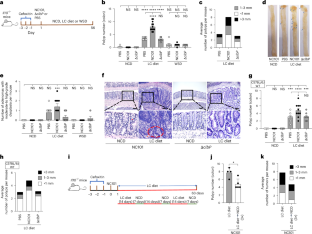Dietary fibre counters the oncogenic potential of colibactin-producing Escherichia coli in colorectal cancer
IF 20.5
1区 生物学
Q1 MICROBIOLOGY
引用次数: 0
Abstract
Diet, microbiome, inflammation and host genetics have been linked to colorectal cancer development; however, it is not clear whether and how these factors interact to promote carcinogenesis. Here we used Il10−/− mice colonized with bacteria previously associated with colorectal cancer: enterotoxigenic Bacteroides fragilis, Helicobacter hepaticus or colibactin-producing (polyketide synthase-positive (pks+)) Escherichia coli and fed either a low-carbohydrate (LC) diet deficient in soluble fibre, a high-fat and high-sugar diet, or a normal chow diet. Colonic polyposis was increased in mice colonized with pks+ E. coli and fed the LC diet. Mechanistically, mucosal inflammation was increased in the LC-diet-fed mice, leading to diminished colonic PPAR-γ signalling and increased luminal nitrate levels. This promoted both pks+ E. coli growth and colibactin-induced DNA damage. PPAR-γ agonists or supplementation with dietary soluble fibre in the form of inulin reverted inflammatory and polyposis phenotypes. The pks+ E. coli also induced more polyps in mismatch-repair-deficient mice by inducing a senescence-associated secretory phenotype. Moreover, oncogenic effects were further potentiated by inflammatory triggers in the mismatch-repair-deficient model. These data reveal that diet and host genetics influence the oncogenic potential of a common bacterium. Reduced dietary fibre together with mutations in the host mismatch repair machinery promote colon carcinogenesis by increasing inflammation, nitrate-fuelled growth of colibactin-producing Escherichia coli and colibactin-dependent genotoxic tissue damage.


膳食纤维对抗结肠直肠癌中产生大肠杆菌素的大肠杆菌的致癌潜力
饮食、微生物群、炎症和宿主遗传与结直肠癌的发展有关;然而,这些因素是否以及如何相互作用促进致癌尚不清楚。在这里,我们使用了Il10−/−小鼠,定植了先前与结直肠癌相关的细菌:产肠毒素的脆弱拟杆菌、肝幽门螺杆菌或产生大肠杆菌素的大肠杆菌(聚酮合成酶阳性(pks+)),并喂食缺乏可溶性纤维的低碳水化合物(LC)饮食、高脂肪和高糖饮食或正常食物。在pks+大肠杆菌定殖的小鼠中,饲喂LC日粮的小鼠结肠息肉病增加。在机制上,低脂饮食喂养的小鼠粘膜炎症增加,导致结肠PPAR-γ信号减少和肠道硝酸盐水平增加。这促进了pks+大肠杆菌的生长和大肠杆菌素诱导的DNA损伤。PPAR-γ激动剂或添加菊粉形式的膳食可溶性纤维可逆转炎症和息肉病表型。pks+大肠杆菌还通过诱导衰老相关的分泌表型,在错配修复缺陷小鼠中诱导更多的息肉。此外,在错配修复缺陷模型中,炎症触发进一步增强了致癌作用。这些数据表明,饮食和宿主基因会影响一种常见细菌的致癌潜力。
本文章由计算机程序翻译,如有差异,请以英文原文为准。
求助全文
约1分钟内获得全文
求助全文
来源期刊

Nature Microbiology
Immunology and Microbiology-Microbiology
CiteScore
44.40
自引率
1.10%
发文量
226
期刊介绍:
Nature Microbiology aims to cover a comprehensive range of topics related to microorganisms. This includes:
Evolution: The journal is interested in exploring the evolutionary aspects of microorganisms. This may include research on their genetic diversity, adaptation, and speciation over time.
Physiology and cell biology: Nature Microbiology seeks to understand the functions and characteristics of microorganisms at the cellular and physiological levels. This may involve studying their metabolism, growth patterns, and cellular processes.
Interactions: The journal focuses on the interactions microorganisms have with each other, as well as their interactions with hosts or the environment. This encompasses investigations into microbial communities, symbiotic relationships, and microbial responses to different environments.
Societal significance: Nature Microbiology recognizes the societal impact of microorganisms and welcomes studies that explore their practical applications. This may include research on microbial diseases, biotechnology, or environmental remediation.
In summary, Nature Microbiology is interested in research related to the evolution, physiology and cell biology of microorganisms, their interactions, and their societal relevance.
 求助内容:
求助内容: 应助结果提醒方式:
应助结果提醒方式:


